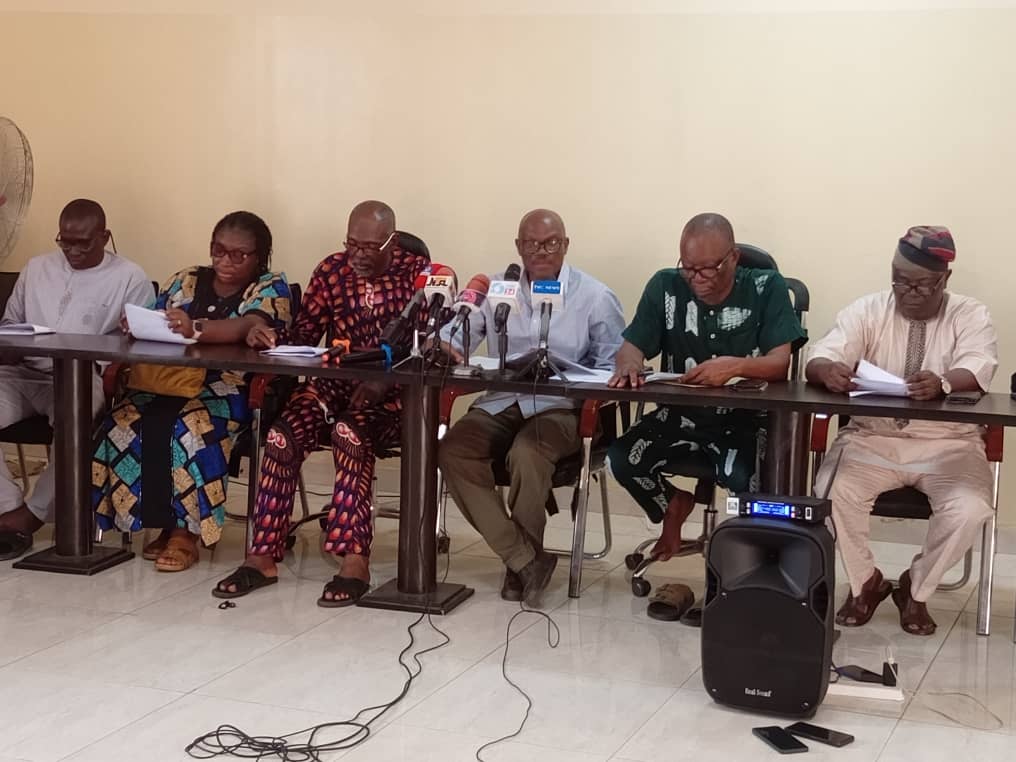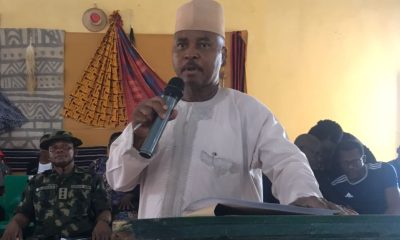Education
SDGs: 8 Years to Deadline, Future of Nigeria Child Uncertain

By Laide Akinboade
The future of Nigeria Children will be bleak if by 2030 Nigeria is not able to attain all the 17 goals of Sustainable Development Goals SDGs. Especially those ones that are related to child educational development, goals 1 -4,. (No Poverty, (2) Zero Hunger, (3) Good Health and Well-being, (4) Quality Education).
8 years to deadline for attainment of Sustainable Development Goals, SDGs, the progress made by Nigeria on goals 1to 4 (No Poverty, No Hunger, Good Health and Well-Being and Quality Education), are goals that have to do with developmental stages of children and the nation appears to have huge challenges in attainment of these goals.
All the above goals if attained by Nigeria in 2030 would guarantee quality future for Nigeria children.
In 2017, the World Economic Forum ranked Nigeria 120th out of 136 countries with regard to the quality of primary education.
With only 7% budgetary allocation and 1.7% Gross Domestic product, to education, attainment of SDGs 1-4 would be a mirage for the nation except it increases investment in the education.
Goal 4 (Education) ensures that all girls and boys complete free primary and secondary schooling by 2030. It also aims to provide equal access to affordable vocational training, and to eliminate gender and wealth disparities with the aim of achieving universal access to a quality higher education.
There is need for training and re-training of teachers, good renumeration in order to get the best results from teachers and quality students.
Right now in Nigeria, almost half the population (about 46 per cent) currently are under the age of 15.
Over 10 million Nigerian children are out of schoolNigeria ranks higher in out-of-school children than anywhere else in the world.
According to United Nations Children’s Funds, UNICEF, over 70% of 10-year-old school children in Nigeria cannot understand a simple sentence or perform basic numeracy task.
From the above, Nigeria’s education sector is in serious crisis. That means 70% of under 11 years old that are in school can barely read, grasp what they are being taught in school
Apart from the over 10 million out of school children, Nigeria is facing a serious learning crisis in which learning is not taking place, even for children that are in school.
This should be a great concern for any government of the day, that means these children do not have the necessary skills and hence their great future cannot be guaranteed.
According to Manar Sharounda, United Nations Children’s Funds, UNICEF, Education Manager, Nigeria, at a two day program for the media, she lamented that the nation problem is not lack of policies but the problem is lack of implementation of policies that are available.
“Goal four of the SDGs is to ensure inclusive and equitable quality education that promotes lifelong learning and all children by age 10 must know how to read and solve numeracy.
“It is not that Nigeria lacks the right policy but Nigeria is facing a staggering crisis with learning outcomes being one of the lowest.
“So, 70% of the children in school are not achieving basic foundational skills,” she said.
Research has shown that Nigeria has improved in basic education, in terms of access but much needed to be done in the area of quality of teachers and students.
A recent World Bank research indicates that Nigeria is going through learning poverty, where 70% of 10-year-olds who are in school cannot understand a simple sentence or perform basic numeracy tasks while 69% of primary school teachers are unqualified to be in the classroom.
Elhadji Diop, an education specialist at UNICEF, at a rec Mt event said education is a fundamental human right of every child and it is imperative for Nigeria to upheld.
‘‘Education is a fundamental human right and that right is well-articulated in the UN Convention on the Rights of the Child, including the Nigerian Constitution,’’ he said.
What is Sustainable Development Goals, SDGs, after 15 years (2000 -2015), the United Nations, UN, Millennium Development Goals, MDGs, came to an end in 2015. But in order to ensure that the gain recorded by MDGs are not eroded , the UN General Assembly in the same year came up with Sustainable Development Goals, SDGs,. It projected to run until 2030.
Just like MDGs, SDGs had do with global human and material resources, but on a rather larger scale. SDGs is a 17 cardinal point which include, No poverty, Zero hunger, Good health and Wellbeing, Quality education, Gender equality, Clean water and Sanitation, Peace and Justice, Strong Institutions, Climate action and affordable and Clean energy Decent work, Economic growth, Reduc inequality.
The proper implementation of SDGs will have huge impact on protection of the Right of Nigeria child as enunciated in the 189 UN Convention on the Rights of the Child and it’s Nigeria domesticated version, the 1993 Child Right Act.
The future of Nigeria Child depend on the proper implementation of the Child Right Act, that has already been domesticated in Nigeria
Some of the challenges that that Nigeria is facing that can affect it achieving the 17 goals on SDGs, and hence the future of a Nigeria child, include, poor funding of education in the budgets, out-of-school-children, prolonged neglect of learning environments and facilities. According to research funding has been identified as a key issue and it is also an underlying factor militating against the achievement of many other challenges. The other key challenge of poor school enrolment cannot be resolved with persisting insecurity and Almajiri problems in the northern parts of Nigeria. Without concerted effort to increase the budget for education and ensuring that allocated funds are not misappropriated, it will not be possible to achieve the SDG 4.
Even though since the adoption of the Sustainable Development Goals (SDGs) in September 2015, Nigeria has continued to demonstrate its commitment to achieving the global goals through leadership and ownership of the implementation process. But a lot still need to be done in the areas of increase funding, drastically reducing the over 10 million out of school children by making education accessable, by ensuring that every child get a quality education by addressing the challenge of learning crisis, with over 70% of 10-year-old school children in Nigeria cannot understand a simple sentence or perform basic numeracy task, by increasing budgetary allocation to education, the required 50% allocation, by training and retraining teachers, and availability of infrastructure and conducive learning environment for Nigeria child.
Education
Strike Looms as ASUU Accuses FG of Endless Agreement Negotiations, Others

By David Torough, Abuja
The Academic Staff Union of Universities (ASUU) has once again raised the alarm over the Federal Government’s persistent failure to honour past agreements, warning that another nationwide strike may be imminent.
ASUU’s new President, Professor Chris Piwuna, at a press conference in Abuja on Friday criticised the government’s inaction on critical issues affecting Nigerian universities.
Piwuna demanded the immediate implementation of all Memoranda of Understanding (MoUs) and Memoranda of Action (MoAs) signed since 2013.
ASUU emphasised that fixing Nigeria requires fixing its universities, which are plagued by poor funding, stalled agreements and government neglect.
The Union also demanded the release of withheld salaries from the 2022 strike and payment to lecturers on part-time and sabbatical appointments affected by the IPPIS payroll system, while condemning political interference in university administration, unlawful appointments, and the undermining of institutional independence.
It further called for an education summit, proper implementation of past agreements, and a stop to the misuse of TETFund resources. It warned it will not remain passive while its members’ rights are trampled.
ASUU urged the government to resolve all outstanding issues to avoid further disruption. While open to dialogue, the union signaled potential industrial action if demands are ignored, reaffirming its commitment to the struggle for quality education.
“Almost three decades since Nigeria’s return to civilian governance, it is not yet Uhuru. The country is still pathetically trapped in the web of multifaceted political malfeasance graphically sign-posted by prebendal politics, mindless manipulation of electoral processes, brazen nepotism, and deliberate subversion of people’s will at every level of governance.
“The sum total of all these is that transparency and accountability have become rare commodities in the hands of the managers of the Nigerian state. Consequently, the generality of citizenry have become despondent, having lost hope and faith in government and its agencies.
“If given the desired attention, Nigeria’s universities should provide the solution ground to solving its multi-faceted and multi-dimensional problems. ASUU has remained focused in the struggle for improved funding and revitalization of these institutions.
“A starting point to achieve this noble goal is to prevail on government to address all outstanding issues in our previous engagements. This will create a conducive atmosphere for addressing the welfare issues of Nigerian academics for the optimal discharge of their statutory responsibilities as the think-tank of the country and mentors for future leaders in all aspects of national development. ASUU remains open to discussion in this respect.
“However, the Union would not continue to look helpless while the rights of its members are being trampled upon and washed away with reckless abandon.”
ASUU stated that the level of implementation of the 2009 FGN/ASUU Agreement is not encouraging, saying that although a few issues are partially implemented, many remain unaddressed.
These, it said include the conclusion of the renegotiation of the 2009 Agreement based on the Nimi Briggs Committee’s draft agreement of 2021; release of withheld three-and-a-half months’ salaries due to the 2022 strike; release of unpaid salaries for staff on sabbatical, part-time, and adjunct appointments affected by the Integrated Payroll and Personnel Information System (IPPIS); release of outstanding third-party deductions such as check-off dues and cooperative contributions; funding for the revitalization of public universities; payment of Earned Academic Allowances (EAA); concerns over the proliferation of universities by federal and state governments; non-constitution of some universities’ governing councils; and adoption of the University Transparency and Accountability Solution (UTAS) in place of IPPIS.
It noted that the government agreed to mainstream the EAA into salaries with the creation of an irregular allowance as a budget line in the 2026 Budget, after releasing N50 billion for the backlog and budgeting N29 billion for the payment of 2025 Earned Academic Allowances and agreed to release N150 billion as a revitalisation fund within four weeks from April 2025.
“However, we are still waiting for government to fulfil these promises. The Union has also reached an understanding with the Yayale Ahmed-led Committee, following the review of the report of the Nimi Briggs-led FGN-ASUU Renegotiation Committee in December 2024. Again, ASUU members have been left in limbo, waiting for the signing of an agreement five months after.
“Delegates at the UNIBEN National Delegates Conference exhaustively evaluated the government’s disposition in resolving outstanding issues with the Union and expressed regrets that nothing has significantly changed in the last two years.
“The irreducible minimum that can guarantee industrial harmony in the Nigerian University System (NUS) is for government to speedily address all outstanding issues including conclusion of the renegotiation of the 2009 FGN/ASUU Agreement, payment of the withheld three-and-a-half months’ salaries, release of the backlog of promotion arrears, payment of withheld salaries of sabbatical and part-time lecturers on account of not signing into the discredited IPPIS, and addressing the unjust victimization of ASUU leaders and members in some state universities.
“Beyond these, we demand a faithful implementation of all issues arising from our previous Memoranda of Understanding (MoUs) and Memoranda of Action (MoAs) government signed with ASUU since 2013.”
ASUU also called on state governors and visitors to these universities to, without further hesitation, resolve lingering issues and reinstate its members without delay in the interest of justice and industrial peace.
On the erosion of university autonomy, the union expressed deep concern. “ome recent developments in Nigeria’s public universities are of grave concern to our Union. We are discomfited by the ongoing attempts to completely erode the autonomy of public universities by the political class and the bureaucrats.”
community
UTME: JAMB To Hold Additional Mop-up Exam for Absent Candidates

Joint Admissions and Matriculation Board (JAMB) says it will conduct additional mop-up examinations for candidates who missed the 2025 Unified Tertiary Matriculation Examination (UTME).
JAMB Registrar, Prof. Is-haq Oloyede, stated this on Wednesday in Abuja at a meeting with key stakeholders to address the challenges encountered during the 2025 UTME.
Oloyede said that the board would accommodate the estimated 5.
6 per cent of candidates who missed the examination by organising a special mop-up exercise.He said that the board had extended the opportunity to all the affected candidates, regardless of the reasons for their absence.
“Normally, we hold one mop-up nationwide for those with one issue or the other.
“But this time, we are creating a new mop-up. Even those who missed the earlier examination due to absence, we will extend this opportunity to them.
“It is not that we are doing something extraordinary; in class, you make up an examination when students miss it for one reason or the other; we just don’t allow abuse of that.
“So we will allow all the candidates who missed the main examination for any reason to take part in this mop-up,” he said.
Oloyede criticised some public commentators who misunderstood and misrepresented the role of UTME, while clarifying that UTME was a placement test and not an achievement test.
According to him, the purpose of the examination is to rank candidates for available spaces in institutions and not to measure intelligence or overall academic potential.
The registrar further stated that high UTME score was not the sole determinant of admission, adding that combined performance, including post-UTME scores and school assessments, could significantly affect a candidate’s ranking.
While acknowledging the emotional strain experienced while announcing the UTME results, he noted that this was not indicative of an institutional weakness.
He expressed JAMB’s commitment to resolving issues affecting the examination process, even as he rejected comments suggesting that the administrative failure was due to incompetence or ethnic bias.
“I want to say this clearly, particularly because I accepted responsibility, not because I do not know how to do the work.
“I say it for the fourth time that no conspiracy theory is relevant to this case.
“Something happened; like people who have been doing something well for years and something just went wrong. That I should now throw them under the bus? No,” he said.
Oloyede, who frowned at those exploiting difficulties to promote ethnic or conspiracy-driven narratives, urged stakeholders to stop ethnic profiling in the education sector.
According to him, many of the criticisms of JAMB’s operations are rooted in ignorance.
The registrar, however, commended his team’s efforts, while also appreciating the resilience shown by candidates, many of whom, he said, had continued their exams, notwithstanding the various challenges. (NAN)
Education
Using CBT for WAEC Will Adversely Affect Sciences— Ebonyi Reps Member

A Federal Lawmaker from Ebonyi, Chief Chinedu Ogah, has declared that the usage of the Computer Based Technology (CBT) for the West African Examination Council (WAEC) would adversely affect science subjects.
Ogah, who represents Ikwo/ Ezza South Federal Constituency at the House of Representatives, made the declaration on Tuesday while speaking with newsmen on WAEC’s proposed plan to introduce CBT from 2026.
The lawmaker said that the move would affect several scientific applications practically used to access students in WAEC examinations.
“What will happen to several scientific.mixtures, equations, mathematical applications among others practically applied during WAEC examinations?.
“Such measures are evidently not feasible and will adversely affect sciences in our educational curricular.
“Science is practical and the earlier we understand this, the better for all,” he said.
He noted that the glitches recorded during the recent Joint Admission and Matriculation Board (JAMB) examination was unfortunate.
“The registrar should review the activities of its Information Communication Technology (ICT) department.
“It is ridiculous for JAMB to conduct the examination without adequate provisions for the ease of candidates,” he said.
Ogah urged people from the south east zone which the glitch was touted to have targeted, to embrace the home grown technology it was known for.
“We are known for technology and innovation.
“Government of south east states should equip our schools with ICT so that students would be acquainted with its usage, early,” he said. (NAN)


























